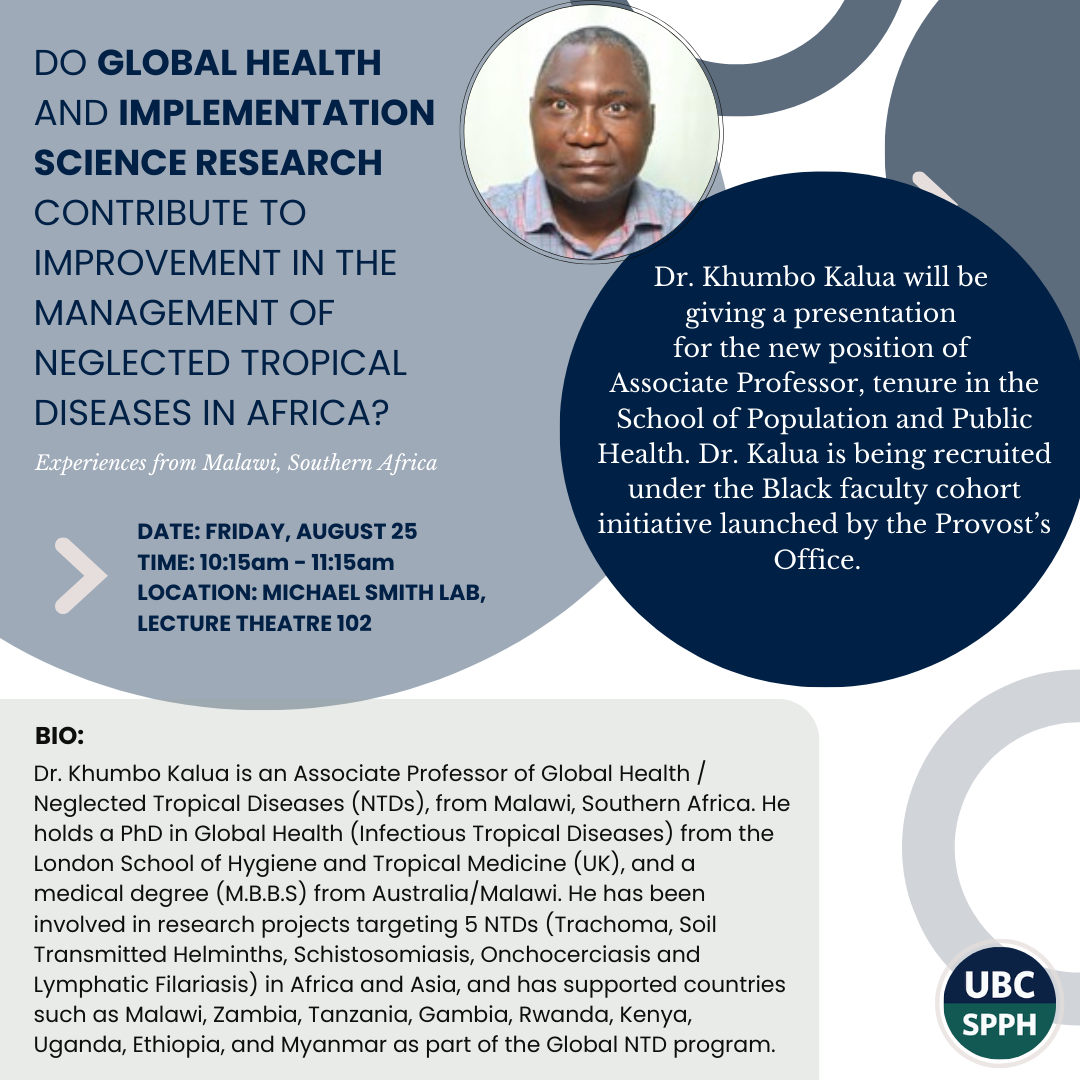
Do Global Health and Implementation Science Research Contribute to Improvement in the Management of Neglected Tropical Diseases in Africa? Experiences from Malawi, Southern Africa.

You are invited! Dr. Khumbo Kalua will be giving a presentation on Friday, August 25, 2023, for the new position of Associate Professor, tenure in the School of Population and Public Health. Dr. Kalua is being recruited under the Black faculty cohort initiative launched by the Provost’s Office.
The program encourages cohort hires, recognizing the ways in which this promotes interdisciplinary collaborations and helps create communities of support for scholars from underrepresented groups.
For more information about the initiative as well as the principles and guidelines of the program, please go to https://academic.ubc.ca/faculty-careers/black-faculty-cohort-hiring-initiative.
Presentation: Do Global Health and Implementation Science Research Contribute to Improvement in the Management of Neglected Tropical Diseases in Africa? Experiences from Malawi, Southern Africa.
Location: Michael Smith Lab, Lecture Theatre 102
Zoom Details: https://ubc.zoom.us/j/67816792078?pwd=QzFFbXJSK3lGSnFkZkZwSEZ6ZzdIZz09
Meeting ID (if link above doesn’t work): 678 1679 2078
Meeting password (if link above doesn’t work): 365263
About the presentation
Background:
Neglected Tropical Diseases (NTDs), caused by a variety of pathogens, such as bacteria, protozoa, and parasitic worms (helminths) are common in low-income populations mainly in Africa and Asia, and affect billions. Five NTDs (Trachoma, Onchocerciasis, Lymphatic Filariasis, Schistosomiasis, and Soil-Transmitted Helminths) can be treated by Community Mass Drug Administration (MDA) at the population level, as recommended by World Health Organization (WHO). Which strategies work best? Can Cluster Randomized Clinical Trials (RCTs) be used to assess the effectiveness of the population interventions? How do we apply Implementation Science in NTDs to scale up interventions? The presentation will focus on answering these questions.
Methods:
Presentations of 2 separate RCTs that involved the use of drugs for NTDs.
The first large RCT is a multi-county trial involving Malawi, Niger, and Tanzania, where clusters were randomized to 1) the intervention: Azithromycin antibiotic Therapy for prevention of under-five Mortality versus 2) Control: Placebo drugs given to under-five children, over 2 years period.
The second large RCT is also a multi-country trial involving Malawi, Benin, and India, aimed at determining population interruption of Soil-Transmitted Helminths infection (STH). 40 Clusters were randomized to 1) the intervention:6 monthly dosages of Albendazole for Soil Transmitted Helminths given to communities versus 2) Control: Annual dosages of Albendazole for Soil Transmitted Helminths given to school-aged children only, for over a 3-year period.
Results:
The 1st RCT targeted 90,000 under-five children in Malawi, Niger, and Tanzania and showed a 14.6% reduction in mortality in the intervention arm(P<0.001).
The 2nd RCT targeted 131,000 residents in Malawi. At baseline, 5932 samples of human stools were collected and analyzed and had Quantigen qPCR positivity of STH of 14.9%, 97.3 % of all organisms being Necator americanus (Hookworm). Over 70,000 additional stool samples collected during the trial are currently undergoing analysis.
Discussion/Conclusion:
What can we learn from the Clinical Trials in Malawi?
Can we reduce under-five child mortality in Africa through drugs for NTDs?
Is it possible to eliminate NTDs in poor countries with resource constraints?
What are the future implications for Global Population Health and Implementation Science?
Are there any areas of potential collaboration for NTD research?
About the presenter
 Dr. Khumbo Kalua is an Associate Professor of Global Health / Neglected Tropical Diseases (NTDs), from Malawi, Southern Africa. He holds a PhD in Global Health (Infectious Tropical Diseases) from the London School of Hygiene and Tropical Medicine (UK), and a medical degree (M.B.B.S) from Australia/Malawi. He has been involved in research projects targeting 5 NTDs (Trachoma, Soil Transmitted Helminths, Schistosomiasis, Onchocerciasis and Lymphatic Filariasis) in Africa and Asia, and has supported countries such as Malawi, Zambia, Tanzania, Gambia, Rwanda, Kenya, Uganda, Ethiopia, and Myanmar as part of the Global NTD program.
Dr. Khumbo Kalua is an Associate Professor of Global Health / Neglected Tropical Diseases (NTDs), from Malawi, Southern Africa. He holds a PhD in Global Health (Infectious Tropical Diseases) from the London School of Hygiene and Tropical Medicine (UK), and a medical degree (M.B.B.S) from Australia/Malawi. He has been involved in research projects targeting 5 NTDs (Trachoma, Soil Transmitted Helminths, Schistosomiasis, Onchocerciasis and Lymphatic Filariasis) in Africa and Asia, and has supported countries such as Malawi, Zambia, Tanzania, Gambia, Rwanda, Kenya, Uganda, Ethiopia, and Myanmar as part of the Global NTD program.
He has over 10 years’ experience in academia and NTD Research at a Global Population level. His research spearheaded the success of the Trachoma Elimination Program in Malawi, the first country in Southern Africa to be declared by World Health Organization (WHO) to have eliminated blinding Trachoma, as a Public Health problem, in 2022. Dr Kalua has over 70 publications in peer reviewed journals.
Feedback: We would appreciate your feedback about this candidate using the survey link here.
